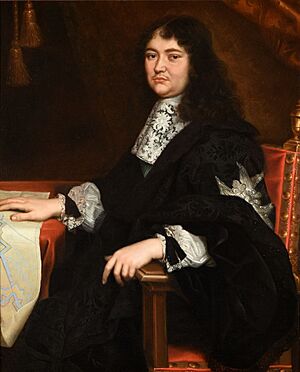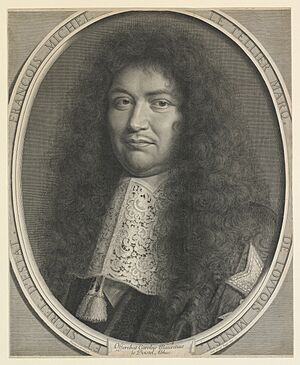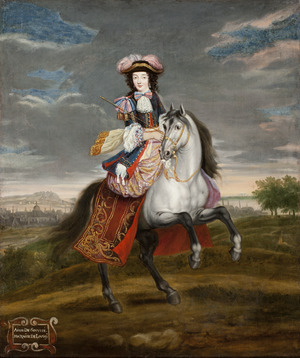François-Michel le Tellier, Marquis de Louvois facts for kids
Quick facts for kids
François Michel Le Tellier
Marquis de Louvois
|
|
|---|---|

Portrait by Pierre Mignard
(Musée des Beaux-Arts, Reims) |
|
| First Minister of State | |
| In office 7 September 1683 – 16 July 1691 |
|
| Monarch | Louis XIV |
| Preceded by | Jean-Baptiste Colbert |
| Succeeded by | Vacant (1691–1715) Guillaume Dubois |
| Secretary of State of the Maison du Roi | |
| In office 6 September 1683 – 16 July 1691 |
|
| Monarch | Louis XIV |
| Preceded by | Jean-Baptiste Colbert |
| Succeeded by | Édouard Colbert de Villacerf |
| Secretary of State of War | |
| In office 24 February 1662 – 16 July 1691 |
|
| Monarch | Louis XIV |
| Preceded by | Michel Le Tellier |
| Succeeded by | Louis François Marie Le Tellier |
| Personal details | |
| Born | 18 January 1641 Paris, France |
| Died | 16 July 1691 (aged 50) Versailles, France |
| Spouse |
Anne de Souvré
(m. 1662–1691) |
| Children | Michel-François Madeleine Charlotte Louis-Nicolas Louis François Camille Marguerite |
| Parents | Michel Le Tellier Élisabeth Turpin |
| Signature | |
François Michel Le Tellier, Marquis de Louvois (born January 18, 1641 – died July 16, 1691) was a very important French War Minister during the time of King Louis XIV. People usually called him "Louvois".
Louvois and his father, Michel le Tellier, worked together to make the French Army much bigger. It grew to 340,000 soldiers! This huge army fought in four wars between 1667 and 1713. Louvois was a key advisor to King Louis XIV. He helped turn the French Army into a strong tool for the king's power and plans with other countries.
Louvois made some big changes to the army. He created new regiments like the Régiment du Roi in 1663 and the Royal-Artillerie regiment in 1673. These ideas were later used by other countries too. Louvois also improved how armies got their supplies. He made the system for storing food better and even introduced portable ovens to bake bread for soldiers. During the Dutch War (1672-1678), he could provide 200,000 meals a day for up to six months. This helped the French king win battles early on. Even with some challenges, historians remember Louvois for creating the important role of a civilian "minister of war."
Contents
Early Life and Rise to Power
Louvois was born in Paris, France, on January 18, 1641. His father, Michel Le Tellier, taught him a lot about how to manage government affairs. Louvois quickly gained the trust of King Louis XIV. In 1666, he took over from his father as the War Minister.
During the War of Devolution (1667–68), a famous general named Turenne noticed Louvois's skills. Turenne taught him how to supply armies properly. After the war ended in 1668, Louvois focused on organizing the French army. The years between 1668 and 1672 were a time of preparation for France. While others worked on finding allies and money, Louvois worked hard to get soldiers for King Louis.
Interestingly, the famous "Man in the Iron Mask" was first mentioned in a letter written by Louvois on July 19, 1669.
Louvois's Work as War Minister

Louvois's work greatly changed the French army and armies in general. He reorganized military awards and created the Hôtel des Invalides. This was a special home for injured soldiers, showing his care for their well-being. He also made sure that noble families in France served in the army or at court. This helped the king keep control and reduce their independence.
The success of his changes was clear in the victories of the Franco-Dutch War (1672–78). After the Peace of Nijmegen, Louvois became even more favored by the king. His father became chancellor, and the influence of another important minister, Colbert, began to fade.
The ten years of peace from 1678 to 1688 were important for France. During this time, Madame de Maintenon became influential. Also, the city of Strasbourg was captured, and the Edict of Nantes was canceled. Louvois played a big part in all these events. He even planned the surprise capture of Strasbourg in 1681 during peacetime.
Louvois also played a role in the cancellation of the Edict of Nantes. This edict had given some religious freedom to Protestants in France. When it was canceled, Louvois made sure the rules were very strict for those who did not follow the king's religion. He believed in strict discipline and complete obedience to the king's power.
Later Life and Passing
In 1683, Colbert, another important minister, passed away. Louvois took over his ministry for public buildings. This meant Louvois was in charge of two things the king loved: war and building projects. Louvois helped France succeed in the early years of the War of the League of Augsburg. In 1688, he started collecting detailed models of French forts, which are now in the Musée des Plans-Reliefs.
Louvois died suddenly on July 16, 1691, after leaving the king's room. Some people wondered if he had been poisoned because his death was so sudden.
Louvois's Lasting Impact
Louvois was a very skilled War Minister. He was able to organize armies from old systems into new ones. He was also excellent at planning military campaigns and cared about the soldiers' well-being. He helped shape the French army into a powerful force that served the king's goals.
Louvois's Family
Louvois married Anne de Souvré, who was an heiress. His father arranged this marriage.
Louvois and Anne had six children:
- Michael François, Marquis de Courtanvaux
- Madeleine Charlotte (1665–1735)
- Louis-Nicolas, Marquis de Souvré
- Louis François Marie, Marquis Barbezieux
- Camille de Louvois
- Margaret (died 1711)
See also
 In Spanish: François Michel Le Tellier de Louvois para niños
In Spanish: François Michel Le Tellier de Louvois para niños
 | Selma Burke |
 | Pauline Powell Burns |
 | Frederick J. Brown |
 | Robert Blackburn |


